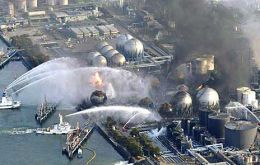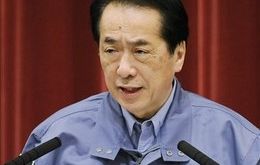MercoPress. South Atlantic News Agency
Tag: Naoto Kan
-
Saturday, July 7th 2012 - 01:11 UTC
“Collusion” much to do with Japan’s Fukushima nuclear crisis, says expert panel

Japan's Fukushima nuclear crisis was a preventable disaster resulting from “collusion” among the government, regulators and the plant operator, an expert panel said, wrapping up an inquiry into the worst nuclear accident in 25 years.
-
Wednesday, August 24th 2011 - 23:43 UTC
Japan's turn to have its rating cut blaming debt and political problems

Moody's Investors Service cut this week its rating on Japan's government debt by one notch to Aa3, blaming a build-up of debt since the 2009 global recession and revolving-door political leadership that has hampered effective economic strategies.
-
Monday, March 21st 2011 - 06:51 UTC
IAEA says Japan’s nuclear emergency remains very serious; death and missing toll reaches 21.000

The United Nations nuclear agency, IAEA, says there have been positive developments in Japan's efforts to tackle a nuclear emergency after the 11 February quake.
-
Monday, March 14th 2011 - 07:05 UTC
Second explosion at nuclear plant damaged by Japan’s earthquake

A second explosion has hit the nuclear plant in Japan that was damaged in Friday's earthquake, but officials said it had resisted the blast. TV footage showed smoke rising from Fukushima plant's reactor 3, a day after an explosion hit reactor 1.
-
Thursday, February 24th 2011 - 03:35 UTC
Moody cuts Japan’s credit rating to “negative” citing concern over debt levels

Moody's Investor Services has cut its outlook on Japan's credit rating to “negative” from “stable” citing concerns about debt levels. Moody's currently rates Japan's government debt at an Aa2 level.
-
Thursday, February 10th 2011 - 23:06 UTC
Japan’s public debt and fiscal deficit “unsustainable” warns IMF

The weight of Japan's public debt, the highest in the world, is unsustainable in the medium and long term warned this week Naoyuki Shinohara, Deputy Executive Director of the International Monetary Fund.
-
Friday, September 17th 2010 - 03:43 UTC
Japan will continue to intervene to keep Yen-priced exports competitive

Japan's prime minister said that authorities would keep intervening to curb the country’s currency strength as sagging manufacturing confidence underscored the threat the currency poses to the fragile economic recovery.
-
Monday, August 16th 2010 - 04:03 UTC
Japan’s economy slows down considerably in second quarter

Japan’s economy expanded at the slowest pace in three quarters. GDP rose an annualized 0.4% in the three months ended June 30 from a revised 4.4% expansion in the first quarter, the Cabinet Office said in Tokyo.
